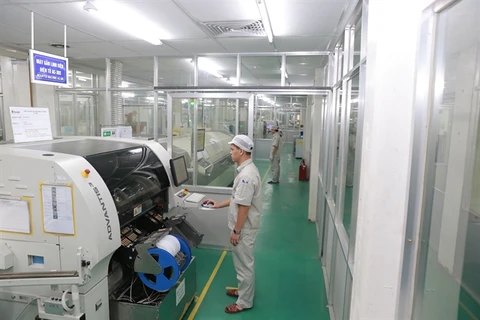 The People's Court of Hanoi. It is advisable for firms to use mediation and arbitration to resolve their commercial disputes rather settle them in court. (Photo: toaan.hanoi.gov.vn)
The People's Court of Hanoi. It is advisable for firms to use mediation and arbitration to resolve their commercial disputes rather settle them in court. (Photo: toaan.hanoi.gov.vn) Chien was speaking at the seminar on "Resolving commercial disputes by mediation and arbitration to promote trade" on October 26.
The deputy director general said Vietnam's international trade was rising steadily on grounds of multilateral agreements, including the CPTPP and EVFTA. Remarkable, its nine-month trade topped 558 billion USD, up 15.1% year-on-year.
As the country becomes more open to trade, so do its domestic firms to commercial disputes. Legally, three tools are available to the firms to resolve disputes out of court, which are negotiation, mediation and arbitration.
"Despite the advantages of mediation and arbitration, firms normally opt for litigation," he said.
Pham Thi Giang Thu, Head of the Vietnam Trade & Investment Arbitration Center (VTIAC), said the arbitration process in Vietnam is regulated by the Law on Commercial Arbitration 2010, which can be used to resolve three specific types of disputes.
The three types of disputes comprise disputes arising from commercial activities, disputes between parties in which at least one of them is engaged in commercial activities, and disputes prescribed by law to be resolved through arbitration.
She said arbitration offers more autonomy to parties with regard to procedural matters. Moreover, its procedures are simple and flexible, saving parties the bother of going through different levels of adjudication.
As an arbitration hearing is kept confidential, parties can preserve their reputation and have their image untouched after the process. Most importantly, arbitral awards are legally enforceable as court verdicts.
"Arbitration has big advantages over litigation in terms of time and costs," she said.
Nguyen Thanh Nam, Director of the law firm GATTACA, said mediation is a form of dispute settlement in which a third party, the mediator, assists parties in conflict in reaching a mutually acceptable agreement.
He said mediation is recommended for firms to resolve disputes as this form of dispute settlement incurs less time and money than legal action.
Additionally, parties can maintain their business relationship after the process as mediation gives them the opportunity to discuss their issues and reach common ground in that regard.
However, mediation has disadvantages. For instance, the unwillingness of one party can make the whole process a waste of time, effort and money.
Additionally, there are uncertainties around the enforceability of a mediation agreement as the agreement needs court orders to be legally binding.
"According to the Ministry of Justice, about 16.9% of disputes were resolved through arbitration, 22.9% through negotiation, 46.8% by litigation in 2018," he said.
Nguyen Minh Tuan, Lawyer of the HCM City Bar Association, spoke in favour of arbitration by pointing to its VTIAC advantages: Validity, Timely, Independent, Authority, and Confidentiality.
Validity means arbitral awards are valid internationally. Timely represents its time efficiency. Independent means the arbitral tribunal is not influenced by external powers.
Authority means parties have the right to choose their own arbitrators with relevant experience and expertise. Confidentiality means arbitration hearings can be held confidentially./.
VNA






















